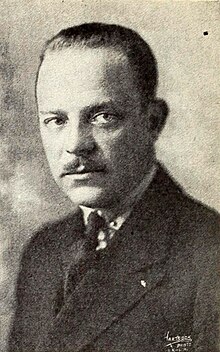Harry Beaumont: Difference between revisions
→Director: update |
|||
| Line 35: | Line 35: | ||
===Director=== |
===Director=== |
||
* ''The Call of the City'' (1915) |
* ''The Call of the City'' (1915) |
||
* ''[[A Man and His Money]]'' (1919) |
|||
* ''[[The City of Comrades]]'' (1919) |
|||
* ''[[The Gay Lord Quex (1919 film)|The Gay Lord Quex]]'' (1919) |
* ''[[The Gay Lord Quex (1919 film)|The Gay Lord Quex]]'' (1919) |
||
* ''[[Lord and Lady Algy (film)|Lord and Lady Algy]]'' (1919) |
* ''[[Lord and Lady Algy (film)|Lord and Lady Algy]]'' (1919) |
||
Revision as of 00:04, 18 August 2019
Harry Beaumont | |
|---|---|
 | |
| Born | February 10, 1888 Abilene, Kansas, U.S. |
| Died | December 22, 1966 (aged 78) Santa Monica, California, U.S. |
| Resting place | Forest Lawn Memorial Park, Glendale |
| Nationality | American |
| Occupation(s) | Director, actor, screenwriter |
| Years active | 1911–1948 |
| Spouse | Hazel Daly |
| Children | 2 |

Harry Beaumont (February 10, 1888 – December 22, 1966) was an American film director, actor, and screenwriter. He worked for a variety of production companies including Fox, Goldwyn, Metro, Warner Brothers, and Metro-Goldwyn-Mayer.
Career
Beaumont's greatest successes were during the silent film era, when he directed films including John Barrymore's Beau Brummel (1924) and the silent youth movie Our Dancing Daughters (1928), featuring Joan Crawford. He then directed MGM's first talkie musical, The Broadway Melody (1929). The latter film won the Best Picture Academy Award that year, and Beaumont was nominated for Best Director.
Personal life
Beaumont was married to actress Hazel Daly.[1] The couple had twin daughters Anne and Geraldine, born in 1922.[2][3]
Death
On December 22, 1966, Beaumont died at St. John's Hospital in Santa Monica, California.[4] He was buried in Forest Lawn Memorial Park, Glendale.
Selected filmography

Director
- The Call of the City (1915)
- A Man and His Money (1919)
- The City of Comrades (1919)
- The Gay Lord Quex (1919)
- Lord and Lady Algy (1919)
- Toby's Bow (1919)
- The Fourteenth Man (1922)
- June Madness (1922)
- Seeing's Believing (1922)
- Glass Houses (1922)
- Crinoline and Romance (1923)
- Main Street (1923)
- The Gold Diggers (1923)
- Beau Brummel (1924)
- The Lover of Camille (1924)
- His Majesty, Bunker Bean (1925)
- Rose of the World (1925)
- Sandy (1926)
- Forbidden Hours (1928)
- Our Dancing Daughters (1928)
- A Single Man (1929)
- The Broadway Melody (1929)
- Our Blushing Brides (1930, uncredited)
- Those Three French Girls (1930)
- Dance, Fools, Dance (1931)
- Laughing Sinners (1931)
- West of Broadway (1931)
- Faithless (1932)
- When Ladies Meet (1933)
- Enchanted April (1935)
- The Girl on the Front Page (1936)
- The Show-Off (1946)
- Undercover Maisie (1947)
- Alias a Gentleman (1948)
Writer
- Brown of Harvard (1918)
References
- ^ "Musical Shows Seen As Field For Sound Film". St. Petersburg Times. January 13, 1929. p. 7. Retrieved February 20, 2013.
- ^ "Harry Beaumont Proud Father of Twin Girls". The Baltimore Sun. September 17, 1922. p. D5.
- ^ Weaver, Sylva (April 11, 1939). "Eastertide Divides Desert Folk". The Los Angeles Times. p. A5.
- ^ "Funeral Set for Harry Beaumont". The Los Angeles Times. December 24, 1966. p. B3.
External links
- 1888 births
- 1966 deaths
- 20th-century American male actors
- Male actors from Kansas
- American film producers
- American male silent film actors
- American male screenwriters
- Burials at Forest Lawn Memorial Park (Glendale)
- People from Abilene, Kansas
- Silent film directors
- Film directors from Kansas
- Screenwriters from Kansas
- American film director, 1880s birth stubs
